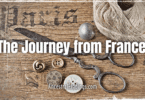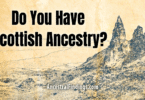Before there were colonies, before there was even a country called America, there were people who made a choice that would echo for centuries. They left behind stone cottages and hedgerows, trading the familiar bells of England for the uncertain silence of the sea.
This is one family’s story told through the letters they left behind.
The Clarkes were ordinary people—craftsmen, parents, believers—who joined thousands of others sailing westward in search of a life free from fear and full of promise.
Their words, preserved across generations, reveal not just the hardships of their voyage but the hope that carried them.
Letter One — Kent, England, March 1635
My dearest brother John,
The last frost still lies over the hedgerows, and yet I find myself packing our things as if spring were already here. The children are restless, asking what America looks like. I tell them it must be like England, but wilder and grander, where the woods stretch farther than sight and no lord claims the fields.
Alice has folded our lives into a single chest: two pewter cups, my tools, her mother’s spoon, and the small Bible Father left me. It is not much, but enough to begin again.
You will have heard by now that I’ve signed our names with the Massachusetts Bay Company. Passage is dear, but we have sold our cottage and the field behind it to pay for it. I will miss the sound of the Maidstone bells on Sunday, though the parson says I am better gone, for I have grown too sharp of tongue. The new bishop takes little mercy on men who question his rule.
Do not think us foolish, John. We go not in anger but in hope. They say there is land for any man who will till it, and peace for those who live faithfully. The sea frightens me, yet the thought of staying frightens me more.
I will write again from the ship if I can. Tell Mother I shall plant an oak in her honor. When it grows tall, I will think of her hands in the soil back home.
Your loving brother,
William Clarke
Letter Two — Aboard The Truelove, May 1635
Dear John,
The sea is endless. For six weeks we have known nothing but its gray face and the wind’s temper. The ship groans like an old beast, and the smell of tar and damp wood fills every breath.
We sleep where we can. The children curl beside Alice under our cloaks. The lantern swings with the waves, throwing shadows that make the timbers seem alive. The food spoils faster than the sailors promised—salted meat, hard biscuits, and water that tastes of the barrel. Still, we thank God for every sunrise.
There are families aboard who pray aloud each night. Others curse the voyage. A boy from Devon died of fever yesterday. The sailors wrapped him in his blanket and spoke the twenty-third Psalm before sliding him into the sea. His mother’s cries have not stopped.
When the storms come, we are told to stay below. The sound is like thunder trapped inside a drum. The ship pitches, barrels break loose, and the children cling to Alice’s skirts, whispering verses they barely know. I keep one hand on the beam and the other on the chest that holds our Bible and tools—our only anchor if the ship turns.
And yet, when the storm clears, the air smells clean again, and the sea shimmers with a light I have never seen on land. Sometimes dolphins follow our wake, leaping through the foam as if guiding us onward. I choose to take that as a sign that God’s hand still steadies this ship.
If we reach America, I will write again.
Your brother,
William
Letter Three — Dorchester, Massachusetts Bay Colony, October 1637
Dear John,
We have survived, though we have been tested in every way. We arrived in midsummer of last year, thin as shadows. The land smelled of pine resin and salt, and when we first saw it, Alice fell to her knees and wept.
Boston is but a cluster of timber houses and a meetinghouse on a hill. Yet, the air here feels lighter—no lords, no bishops, only the voice of the congregation. We were welcomed by other settlers who arrived years before, some from Essex, others from London. They speak of hardship but also of freedom.
I have built barrels for merchants who trade furs and timber back to England. In return, I earn corn, fish, and cloth. We built our own house near a bend in the river. It has a dirt floor and a roof that leaks when it rains, but it is ours. When the children laugh, it almost sounds like home.
Winter is cruel here. The cold seeps through the walls and the wind howls like a living thing. We lost two goats and nearly our courage before spring returned. Still, each thaw feels like a promise kept.
We worship every Sabbath in a small meetinghouse where the men and women sit apart. The sermons are long but kind. No one watches us for disobedience. There are moments when I forget the sound of the old church bells in Kent.
Tell Mother her oak tree grows strong. I planted it by the riverbank. When the wind bends it, I think of her voice calling us in for supper.
Your loving brother,
William
Letter Four — Dorchester, 1671
(Found between the pages of the family Bible)
To my son Thomas,
My days grow shorter now, and I feel the cold more keenly than before. The river still sings at night, though my hearing fades. When I came here as a young man, I thought the wilderness would always seem foreign, but now I cannot imagine any other home.
Never forget that we came from Kent. Though you were born here, that land is in your blood. Speak its name with care. Remember the prayers your mother taught you when we were still new to this place.
I have left a letter folded inside the Bible—the first I ever wrote to your uncle. I never sent it, for there was no ship I trusted enough to carry it home. Keep it there. Let our story stay bound in those pages where the Word and our journey meet.
Your father,
William Clarke
Letter Five — Boston, 1775
To any who shall one day read these words,
My name is Jonathan Clarke, great-grandson of William of Kent. The Bible that crossed the sea with him lies beside me now. Its pages are thin, its cover cracked, and yet it endures.
The world he helped build has changed beyond all measure. The colonies that once bent to England’s rule now rise against it. I march tomorrow with the militia at Lexington. We seek the same freedom our forefathers crossed the sea to find, though now we must defend it with arms instead of faith.
When I open my great-grandfather’s letters, I smell the sea—the same salt air that carried him from home. I can almost see him standing on the docks with his wife and children, the wind lifting his hair, the ship creaking as it took them west. He sought peace; I seek liberty. Both are born of the same longing: to live as one’s conscience demands.
If I fall, may someone keep this Bible safe. It holds not only God’s word but the story of how we became who we are.
— Jonathan Clarke
Letter Six — New Hampshire, 1848
Dear Cousin Sarah,
I send you this letter with a copy of the Clarke family Bible now nearly two hundred years old. It contains the letters you asked about. I have read them all—William’s words from the sea, his talk of the wind and faith and the endless water. I wept to think of what they endured.
We live in a world they could scarcely imagine. Railways carry people farther in a week than William could have dreamed in a lifetime. But I wonder if we have lost something they possessed: the quiet courage to begin again.
The oak tree that William planted still stands by the river, though it leans now. When the wind moves through its branches, it sounds like the tide he once crossed.
If you visit, I will show you where its roots have cracked the old stones. It is as if England herself still whispers through them.
Your cousin,
Elizabeth Clarke
Reflection
The letters of the Clarke family are more than words on paper—they are fragments of history carried forward through faith, endurance, and memory. In their handwriting, we see the shape of an entire era: the courage to leave the known, the patience to endure hardship, and the grace to build something lasting from wilderness.
Each generation added its own line to the story: William’s faith, Jonathan’s fight for liberty, Elizabeth’s remembrance. Together they speak not only for one family but for thousands who crossed from England to the New World, bound by the same thread of hope.
To read their journey is to feel the heartbeat of a world being born—one letter, one prayer, one voyage at a time.
Share Your Story
Do you have ancestors who came from England? Perhaps your family has letters, journals, or stories passed down through generations, just like the Clarkes. I would love to hear about them. Share your family’s journey and memories on our YouTube or Facebook pages, and join others who are exploring their English roots as part of our Journeys of Our Ancestors series. Every shared story helps preserve the past and brings history to life for future generations.






